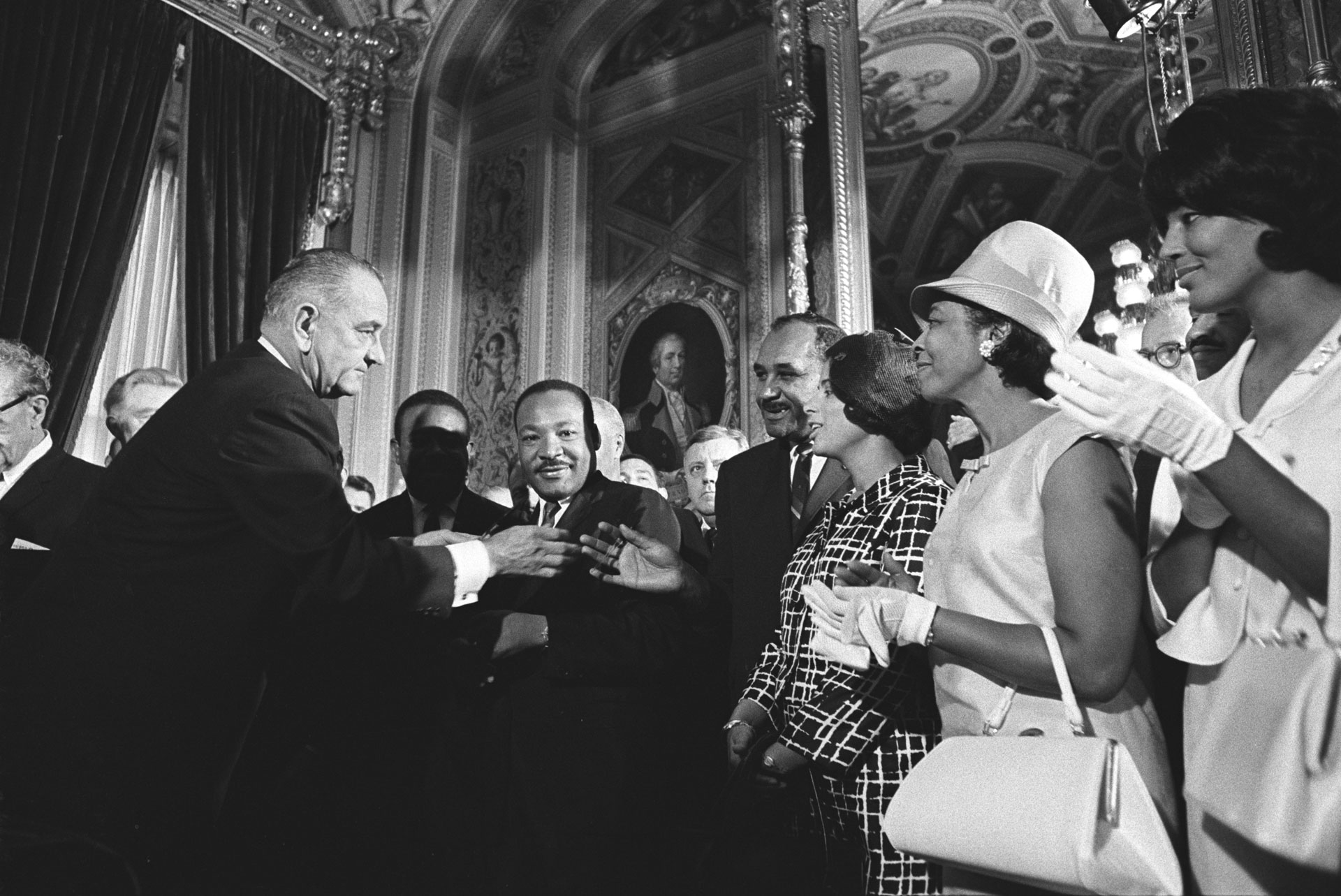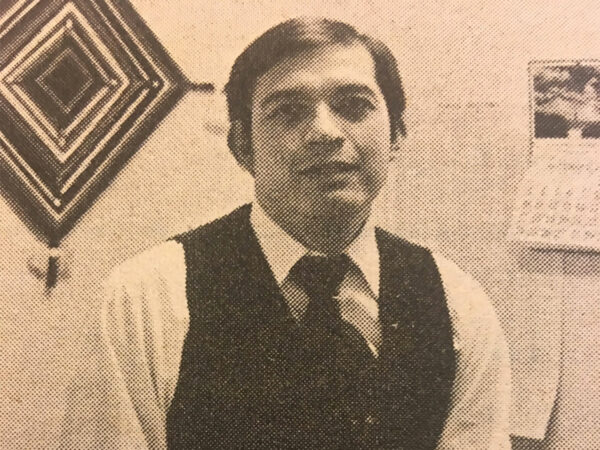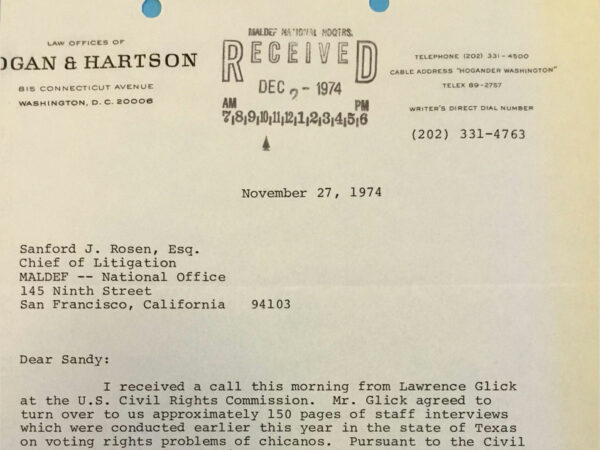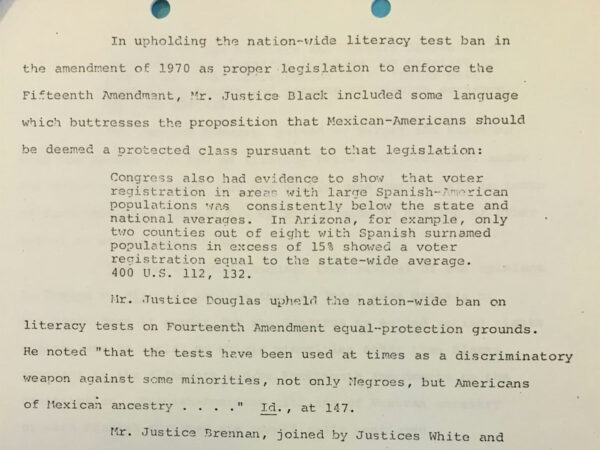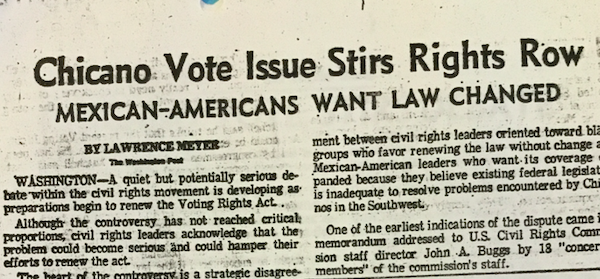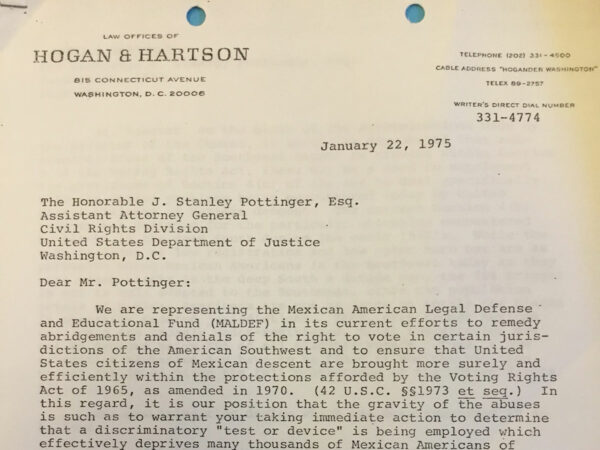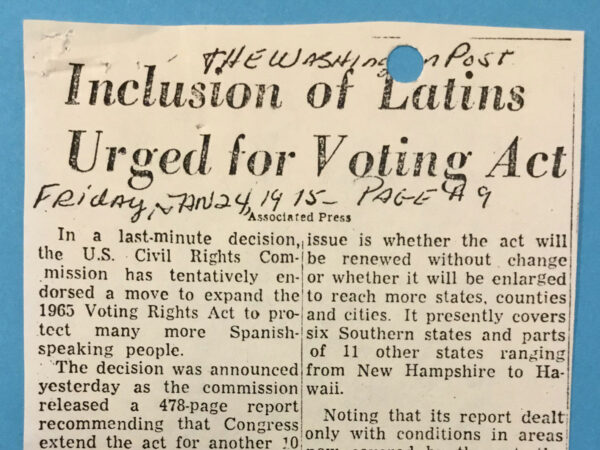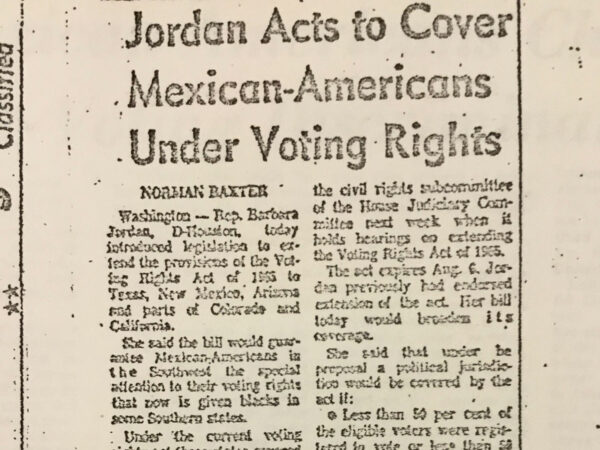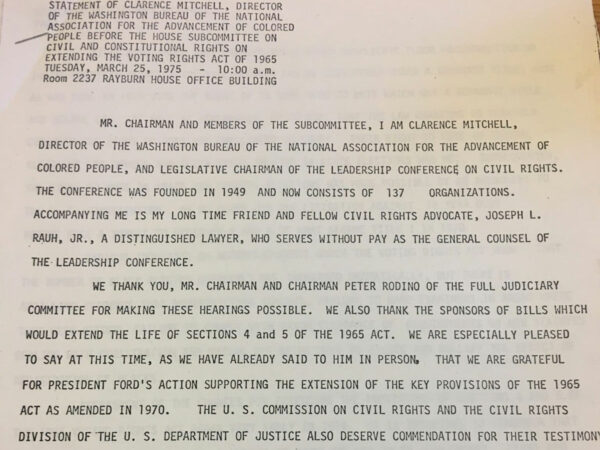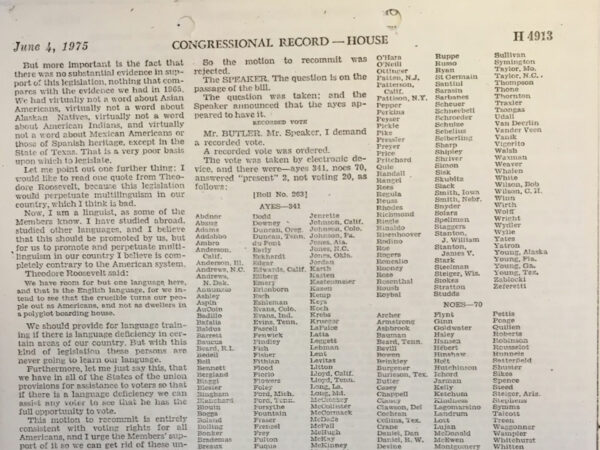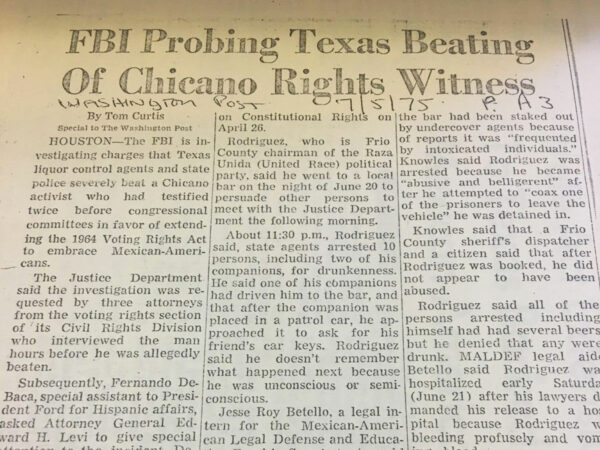1975 Voting Rights Act
Remembering the work that won VRA protections for Latinos and language minorities.
50 Years of Protecting the Latino Vote
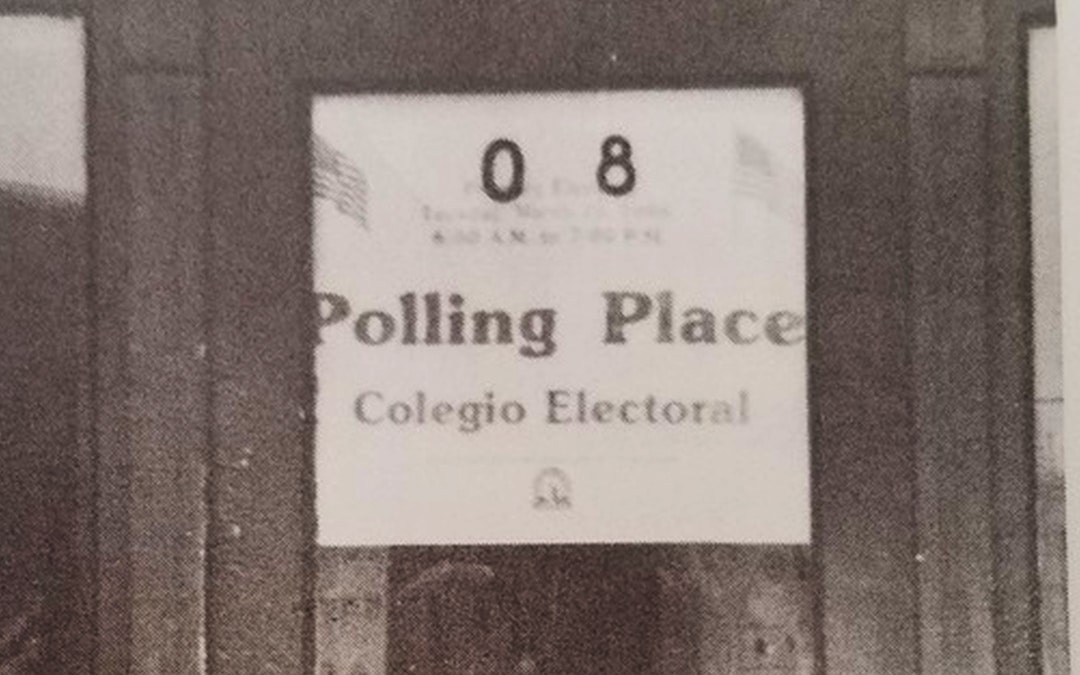
In Uvalde County, Texas, the political atmosphere of 1975 was such that election officials routinely ran out of registration application cards when Latino applicants asked for them. And tough luck for voters who could not read English because election judges refused to assist them.
What occurred in Uvalde County existed all over Texas, said Vilma S. Martinez, then MALDEF president and general counsel. She told a congressional subcommittee that the abuses aimed at keeping Latino voters away from the ballot box were so pervasive, it was impossible to guarantee them a meaningful right to vote through individual private litigation only.
“It would be like attempting to empty the sea with a sand pail,” Martinez said.
She was testifying because MALDEF was leading the push to expand the Voting Rights Act of 1965 to protect Latino voters.
In 1974, MALDEF’s Washington D.C. Counsel, Al I. Perez, decided to seek changes to the VRA after learning from a friend at the U.S. Commission on Civil Rights that, despite receiving considerable testimony about voting rights violations against Mexican Americans, the commission refused to support amending the Act the following year to address violations like those in Uvalde County and elsewhere.
- 1965
- 1970
- July 1974
- 1974
- September 1974
- November 1974
- Nov 27, 1974
- Dec 20, 1974
- Jan 1, 1975
- Jan 22, 1975
- Jan 23, 1975
- Feb 19, 1975
- Mar 13, 1975
- Mar 24, 1975
- Mar 25, 1975
- Apr 30, 1975
- Apr-May 1975
- Jun 4, 1975
- Jun 20, 1975
- Jul 17, 1975
- Jul 24, 1975
- Aug 6, 1975
-
1965
President Lyndon B. Johnson signs the Voting Rights Act (VRA), a landmark civil rights law that outlaws poll taxes, literacy tests and other discriminatory tactics aimed at preventing Blacks from exercising their right to vote. The law also establishes federal oversight in state and local elections with a long history of denying blacks access to the ballot box. The law’s protections extend to Puerto Ricans, but not to Latino citizens in the Southwest or language minorities. (Photo Credit: LBJ Photo Archive: Image A1030-19a)
-
1970
Congress extends the VRA for five years.
-
July 1974
Al I. Perez joins MALDEF’s Washington D.C. office and requests that the organization work to amend the VRA to address the problems facing Latino voters in Texas and the Southwest with the specific aim of extending the law’s requirement for preclearance – -in which a jurisdiction must obtain federal approval to change its election laws — to cover geographic areas where there are a significant number of Mexican Americans.
-
1974
Perez obtains an internal document indicating that the U.S. Commission on Civil Rights is not going to recommend extending the VRA to include Latinos and language minorities despite testimony identifying problems.
-
September 1974
Perez recruits pro bono lawyers David Tatel and Thomas Reston of Hogan & Hartson, a Washington D.C. law firm. Together the three formulate a legal, legislative, media and community outreach strategy of proposed amendments to the VRA’s special provisions of Section 5 to include areas with significant numbers of language minorities.
-
November 1974
MALDEF prepares to file a Freedom of Information Act request to the U.S. Commission on Civil Rights regarding information on the status of the commission’s finding on voting problems in the Southwest.
-
November 27, 1974
Lawrence Glick of the U.S. Commission on Civil Rights contacts Reston to discuss staff interviews and data collected by the commission on voting rights issues facing Mexican Americans.
-
December 20, 1974
Reston sends a memo to Tatel stating that Assistant U.S. Attorney General J. Stanley Pottinger had previously issued a “Memorandum of Decision” that lays out that only complaints received from blacks and Puerto Ricans are protected by the VRA.
-
January 1, 1975
News reports reveal 18 members of the commission’s staff sent a memo months earlier raising concerns over the study of voting rights problems in the Southwest. The memo notes the study is limited at the request of the Leadership Conference on Civil Rights.
-
January 22, 1975
MALDEF petitions the U.S. Attorney General’s Civil Rights Division to use its power under the 1965 Voting Rights Act to determine whether an election held in English in areas where there are substantial number of Spanish-speaking voters is a violation of Section 4 (b) of the act. The letter calls attention to the likelihood that DOJ believes that language minorities are not protected under the VRA and, therefore, the act should be expanded to include such voters.
-
January 23, 1975
The U.S. Civil Rights Commission tentatively endorses the expansion of the VRA to include Spanish-speaking people when it releases its 478-page report recommending the extension of the VRA by Congress.
-
February 19, 1975
U.S. Representative Barbara Jordan of Houston, who initially was reluctant to support expansion, is convinced by evidence of discriminatory voting practices used against Latinos, and introduces legislation to extend the VRA provisions to Texas, New Mexico, Arizona and parts of Colorado and California.
-
March 13, 1975
Modesto Rodriguez, a 33-year-old farmer and activist from Pearsall, Texas, testifies before the Subcommittee on Civil and Constitutional Rights of the House Committee on the Judiciary urging the inclusion of Spanish-speaking citizens in the VRA. Rodriguez’s testimony comes after months of working with MALDEF attorney Al Kauffman in Texas to collect evidence of discrimination against Mexican American voters.
-
March 24, 1975
MALDEF President and General Counsel Vilma S. Martinez testifies before the Subcommittee on Civil and Constitutional Rights of the House Committee on the Judiciary about discrimination facing Latino voters and the organization’s efforts to expand the coverage of the 1965 Voting Rights Act to include the Southwestern states.
-
March 25, 1975
Clarence Mitchell, legislative director of the U.S. Leadership Conference, testifies before the Subcommittee on Civil and Constitutional Rights of the House Committee, urging lawmakers to take up the issue of coverage for language minorities as a separate law because he fears it will jeopardize the extension of the VRA. He tells The Washington Post that waiting for the addition of the language-minority amendment to the VRA could “improve it out of existence”.
-
April 30, 1975
Modesto Rodriguez testifies before the Senate Subcommittee on Constitutional Rights.
-
April -May 1975
MALDEF President and General Counsel Vilma S. Martinez and Rep. Barbara Jordan testify before the Senate Subcommittee on Constitutional Rights.
-
June 4, 1975
The House of Representatives passes H.R. 6219, which amends the Voting Rights Act of 1965 to extend certain provisions for seven years, including the VRA’s Section 5 provision for preclearance, also expanded to cover Texas and parts of the Southwest. H.R. 6219 also permanently bans certain prerequisites to voting and includes new protections for language minorities, such as the requirement of multilingual voting materials.
-
June 20, 1975
Modesto Rodriguez is arrested and beaten nearly to death by police outside of a bar where he was trying to recruit other Chicano voters to testify about voting discrimination before Congress.
-
July 17, 1975
Two investigations into the June 20 beating of Modesto Rodriguez find that the incident is unrelated to the VRA, but still could have involved civil rights violations, according to news reports.
-
July 24, 1975
After conducting several hearings, the U.S. Senate passes H.R. 6219 on a vote of 77-12, extending the VRA and amending it to extend preclearance coverage to all of Texas, part of Arizona, California, Colorado, Florida and New York State and to include protections for language minorities.
-
August 6, 1975
President Gerald Ford signs the 1975 VRA Extension into law. Besides expanding protection to language minorities, the act also requires 513 jurisdictions in 30 states to hold bilingual elections and adds 276 counties to the preclearance requirement for election changes under Section 5, including all of Texas, 14 counties in Arizona, two counties in California, one county in Colorado, three counties in Florida and two in New York.
